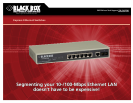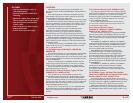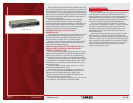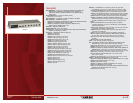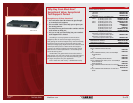
3 of 5
12/13/2007
#23276
These modular switches also include an RS-232 RJ-45 console
port for basic management (cable included) that provides access
to a text-based menu. The menu permits basic configuration of
port parameters (such as changing speed or duplex settings) and
has a proprietary method for assigning the ports into VLAN and
Port-Trunking configuration groups. Remote configuration via
the network is also possible.
Trunking provides extra bandwidth of up to 400 Mbps
between two connected switches. You can also regulate
standard backpressure and autonegotiation on individual ports.
The crossover button enables you to configure one port as an
uplink. These switches occupy only 1U of rack space and are
easily rackmountable with the included hardware.
100-Mbps Fiber Express Ethernet Switch
(LB9008A-FO-R2)
For simplicity, speed, and distance, choose this fiber-only switch.
It provides eight ports of blazing speed and distances of up to
1.2 miles (1.9 km) with all the security of fiber. Best of all, this
entry-level switch is simple to set up—just plug-and-play.
The switch has SC-style fiber connectors and supports 1024
MAC address entries. It has DIP switches and is easy to rack-
mount with the included hardware.
Modular Express Ethernet Switch (LB9217A-R2) and
Modules (LB9213A–LB9216A, LB9218A–LB9219A,
LB9220C-ST, LB9220C-SC-R2)
For the rapidly changing and growing network, the 2
1
⁄2-port
Modular Express Ethernet Switch offers an affordable modular
solution that enables you to customize your switch with any
combination of copper and fiber ports as well as fiber uplinks.
The switch has two slots that you can fill with 8-port modules
in combinations of 100-Mbps multimode fiber ports or 10/100
RJ-45 copper ports. A third “half” slot is reserved for a 1-port
fiber uplink module.
The switch supports several “smart” features such as port-
based VLAN and MAC-based trunking.
The 10/100 copper ports are autosensing for speed and
duplex, and they support auto MDI/MDI-X. Speed and half- or
full duplex can be programmed as either fixed or auto-
negotiating. Fiber ports are all 100-Mbps Fast Ethernet and
come in a choice of ST or SC connectors.
The switch is rackmountable, occupying only 1U of rack space
in a standard 19" rack. Rackmount ears are included.
724-746-5500 blackbox.com
Layer 2 switching.
A switch helps provide a clear path from each workstation
to its destination on demand, whether that destination is
another workstation or a server. In contrast with bridges and
routers (which process data packets on an individual, first-
come, first-served basis), switches maintain multiple, simulta-
neous data conversions among attached LAN segments.
From an end-user workstation’s perspective, a switched
circuit appears as a dedicated connection—a direct, full-speed
LAN link to an attached server or other remote LAN node.
Although this technique is somewhat different from what
a LAN bridge or router does, switching hubs are based on
similar technologies.
Switching hubs that use bridging technologies are called
Layer 2 switches—a reference to Layer 2 or the Data Link
Layer of the OSI Model. These switches operate using the MAC
addresses in Layer 2 and are transparent to network protocols.
Layer 2 switches connect different parts of the same network,
as determined by the MAC address contained in the packet.
You can install a Layer 2 switch anywhere on a network
without reconfiguring the LAN.
Technically Speaking
LB9007A-SC-R3



